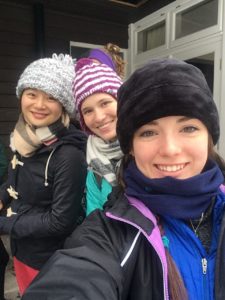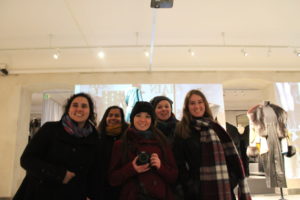How to Study Abroad as a STEM Major
I know what you’re thinking. “I can’t study abroad as a STEM major.” It is a common misconception that STEM majors cannot find classes which count towards their major abroad. This leads to late graduations or overloaded senior years. Now this was certainly not my experience. I’m an engineering major at Harvey Mudd College and I took three technical courses abroad which all counted towards my major. Depending on your home institution, you may need to plan differently in order to study abroad in STEM. I was interested in studying abroad my sophomore year and made an appointment with HMC’s study abroad office to determine how to plan my courses. Your program advisor at IFSA can also help you plan for going abroad. It’s never too early to ask about study abroad, so take a trip down to your study abroad office today!
Choosing your Uni
Now let’s get into the details. It’s likely that your major has course requirements; classes that you’d usually take if you hadn’t made the leap of faith to study abroad. It is important to know what those courses are and how to find equivalent courses abroad. Make a list of the required classes to graduate and try to find 2-3 equivalent classes at a school abroad. IFSA can actually find these courses for you (check it out: here). Plus, your college may even have a list of approved schools and courses for you. University websites should have detailed course descriptions online, but when in doubt, email the professor to ensure that you’ll get the course material you need.

I studied abroad at Queen Mary University of London, a school of 25,000 students situated in East London. I chose Queen Mary because it had many engineering classes I was interested in and fit my requirements. Additionally, QMUL is the only contained campus in London. The other universities have buildings scattered around the city versus having a dedicated campus space. My home college has just under 900 students, so in addition to culture shock, I was nervous about studying at such a large university. I thought that choosing a uni with a dedicated campus would help me feel like a part of the community, despite the large population.
Culture Shock! Classroom Expectations
As you might expect, my classes in the UK were different from my classes in the states. The lectures were larger and there was less interaction with the professors than at my tiny school. You might expect this from a large university, but it is important to point out the difference in class-time expectation. In England, students are expected to spend most of their time dedicated to a class revising outside of lecture.

At my home college, there is significantly more face-to-face interaction with professors through lecture and tutorial sections. Additionally, many of my technical classes had heavily weighted exams and little to no homework. This places a lot of responsibility on the student to keep up with technical knowledge by practicing on one’s own. But don’t worry! In the spring semester, many schools in the UK offer a revision period, usually taking up most of April, where there are no classes and students take time to prepare for their heavily-weighted exams. Before you decide where to study, do some research to determine how classes in your major are structured and graded. You can choose a program that fits your study habits.
What Courses Should I Take?

As I mentioned previously, I took three technical courses abroad and one humanities class. I took Control Systems Design, Analog Electronics, Composites for Aerospace Applications and Gender and Politics in England since 1870. I chose these courses based on my graduation requirements and my engineering focus. It was relatively easy to transition from engineering in California to engineering in England.
There’s no language barrier and many of the technical conventions stay the same no matter where you study in the world. I did notice that the professors had a distinct lecturing style to accommodate so many students of varied backgrounds. I also can’t emphasize how odd it was to not have homework for classes which taught technical skills like the Laplace Transform or circuit analysis. The students are expected to practice outside of class, which creates the need to meet people in your class and revise together. This was a great opportunity to make study groups, especially as finals rolled around.
I would also recommend taking a class involving the culture and history of the country where you’ll be living. It’s a great way to acclimate to your new home. My politics class was a lecture and small discussion group course, which was a similar style to other humanities classes at Harvey Mudd. All in all, my favorite class was Composite for Aerospace Applications, a materials engineering course which is not offered at my home school. I really enjoyed learning about this new topic and the information I learned has been useful in my internships and jobs since then.
Planning Ahead: Internships
Speaking of internships, as a STEM major you may want an internship for the summer following your time abroad. It can be much harder to apply for internships when you’re in such a drastically different time zone. I have friends who snagged internships while they were abroad, but it required a couple late night phone interviews. If possible, I’d recommend applying to internships before going abroad. It will reduce stress and allow you to focus on your time abroad.
Takeaways
Going abroad is an incredible experience! I would recommend studying in the UK to any major and I believe that it’s possible for any major with the required preparation. Just remember to:
- Plan ahead with your home school’s study abroad office
- Find out what STEM classes you need to graduate
- Research schools which offer some of those classes
- [Extra Credit] Apply to internships before you leave

I would study engineering again in England in a heartbeat, I really enjoyed getting a different perspective on how courses are taught in the UK. Many of my peers also had positive experiences studying abroad as engineers, chemists, biologists and mathematicians. It was a refreshing break from my home college and a wonderful change to study in a new culture, while traveling around England and the rest of Europe!
Marianna Sbordone is an Engineering student at Harvey Mudd College and studied abroad with IFSA at Queen Mary University in London, England in Spring 2018.
